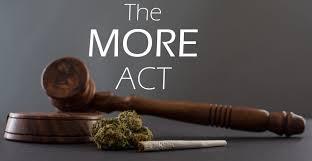Marijuana Opportunity Reinvestment and Expungement (MORE) Act of 2019.
Specifically, this act removes marijuana from the list of scheduled substances under the Controlled Substances Act and eliminates criminal penalties for an individual who manufactures, distributes, or possesses marijuana. The MORE act would overturn over 80 years of marijuana prohibition and criminalization at the federal level.
The Marijuana Opportunity Reinvestment and Expungement (MORE) Act, a bipartisan legislation, was scheduled to be voted upon September 21, but has been postponed until after Election Day. The bill was introduced in July of 2019; it is sponsored in the House by Rep. Jerrold Nadler (D-NJ) and in the Senate by Kamala Harris (D-CA).
This milestone bill would remove cannabis from the Controlled Substance Act, expunge some criminal records and release some from prison, and create funding for people and communities impacted by the war on drugs.

Also included in the bill is a clause that would make Small Business Administration (SBA) loans available to businesses that are legally involved in the cannabis trade. The MORE act would impose a 5% federal tax on all cannabis, thereby ending the days when states that had legalized cannabis kept all of the sales tax and gave none to the federal government. The bill would also require the Bureau of Labor Statistics to regularly publish demographic data on cannabis business owners and employees.
The MORE Act would allow physicians affiliated with the Veterans Administration to prescribe marijuana in states where it is legal. This has huge implications on relief from pain, PTSD, and depression for veterans.
To date, 33 states and the District of Columbia have passed legislation to legalize medical marijuana. Eleven of these states also permit marijuana possession by adults. These states with legalized marijuana employ an average of 243,000 workers, four times as many jobs as the coal industry.
Here are the tax revenue breakdowns for three legalized states:
California: $72.6 million in the first three months of legalized sales in 2018 to $172.7 million in the last three months of 2019. In total, over $1 billion in tax revenue.
Massachusetts: $122 million tax revenue after two years of legalization.
Colorado: 2014 brought in $67.5 million. 2019 brought in $302 million. Cumulative revenue at $1.45 billion.
The National Organization for the Reform of Marijuana Laws (NORML) has been the most outspoken political action committee (PAC), and has reached out to congresspersons to get some clout for the bill.
In that past decade, only 3% of bills became ratified into laws. However, 76% of Democrats in Congress support legislation and 51% of Republicans do.
Like all congressional bills, after passing a committee in the House, the MORE Act will be passed by a simple majority in the House, debated by a committee in the Senate, and then voted by simple majority in the Senate. If the bill is passed by the Senate, President Trump then has the ability to sign the Act into law or veto the bill, as provided by the checks and balances of our political system.
Over 100 health professionals--clinicians, nurses, academics, researchers and social workers--have sent a signed letter to Congress, stating their expert opinions as to how this bill can help hundreds of thousands of people.









